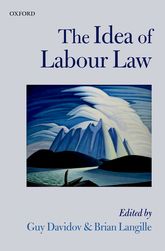Guy Davidov and Brian Langille
Labour law is widely considered to be in crisis, at least by scholars of the field. This crisis has an obvious external dimension—labour law is attacked for impeding efficiency, flexibility and development; vilified for reducing employment and for favouring already well placed employees over less fortunate ones; and discredited for failing to cover the most vulnerable workers and workers in the ‘informal sector’. These are just some of the external challenges to labour law. There is also an internal challenge, as labour lawyers themselves increasingly question whether their discipline is conceptually coherent, relevant to the new empirical realities of the world of work, and normatively salient in the world as we now know it. The goal of this book is to respond to such fundamental challenges by asking the most fundamental questions: What is labour law for? How can it be justified? And what are the normative premises on which reforms should be based? There has been growing interest in such questions in recent years. The current book seeks to take this body of scholarship seriously and take it forward. Its aim is to provide, if not answers which satisfy everyone, at least intellectually nourishing food for thought for those interested in understanding, explaining and interpreting labour laws.

